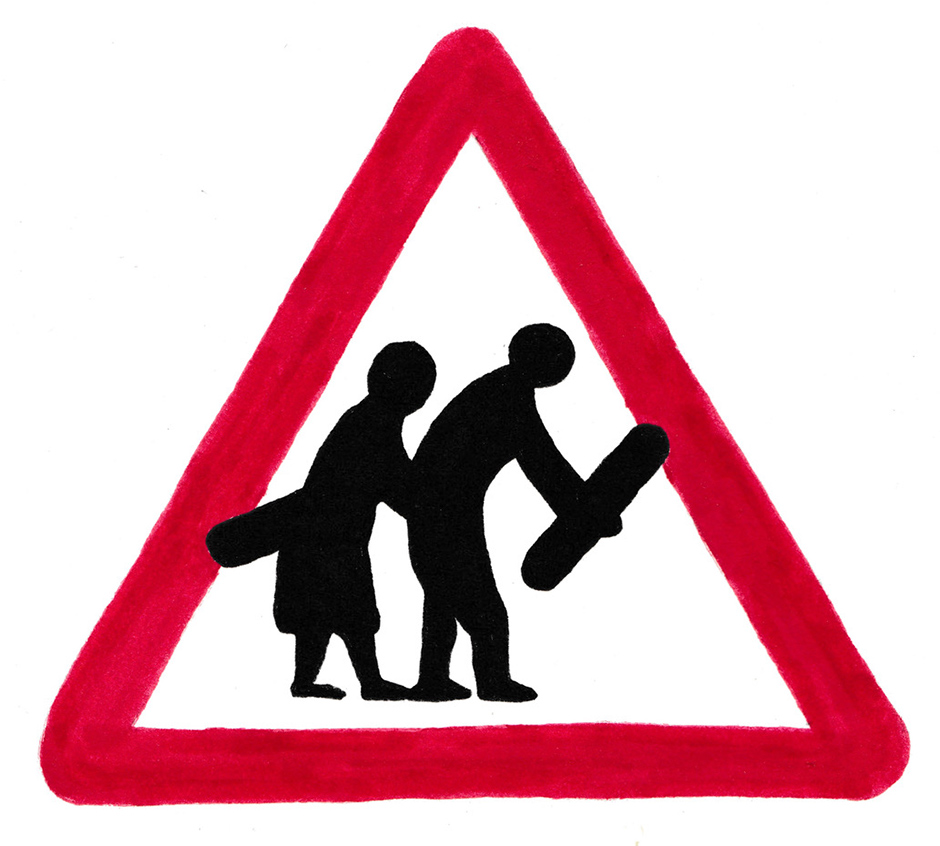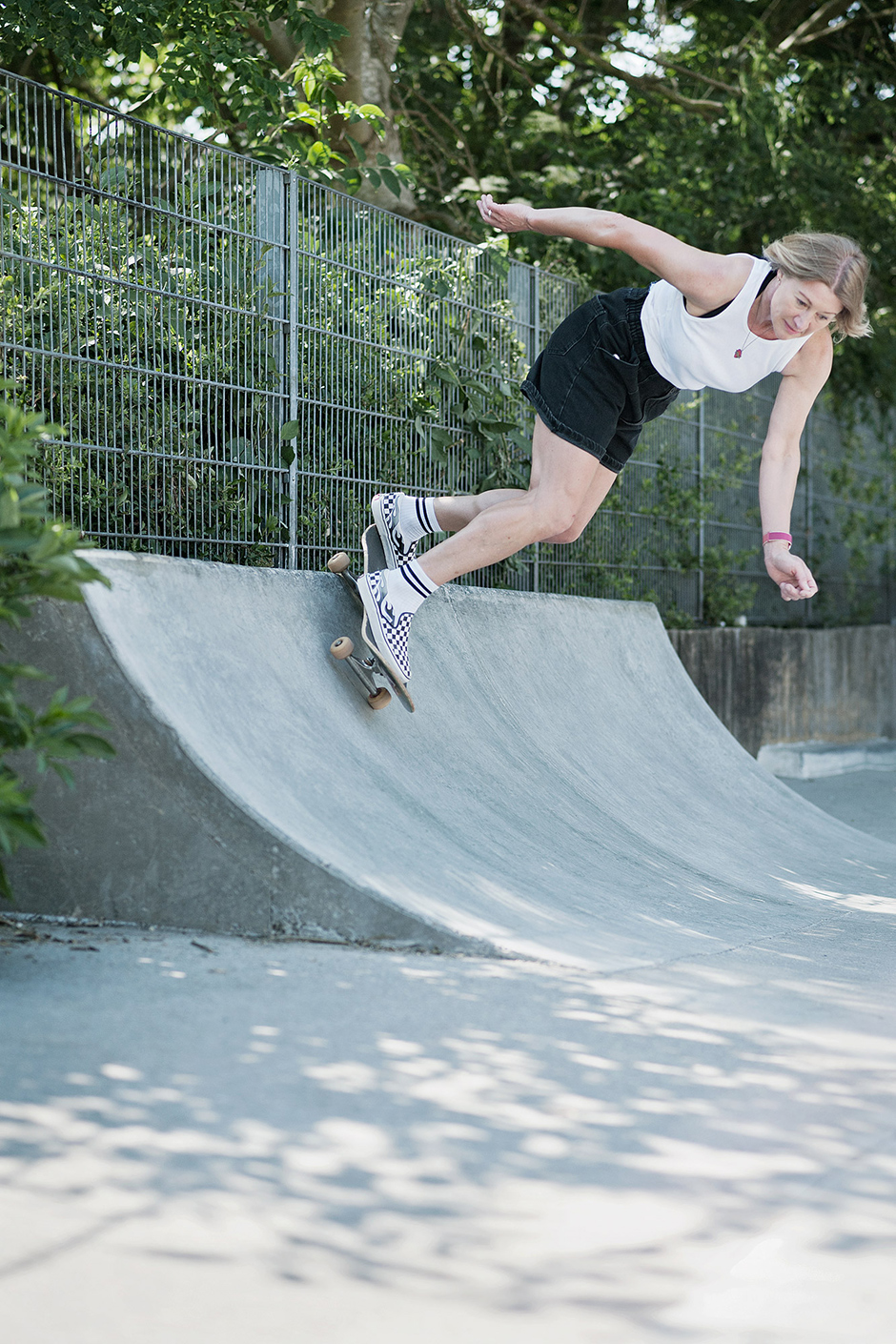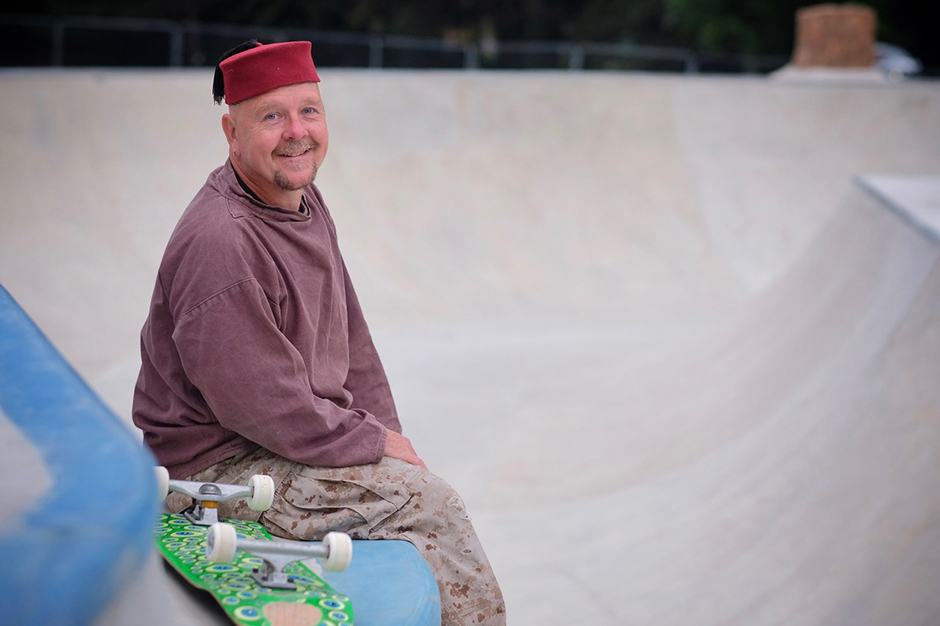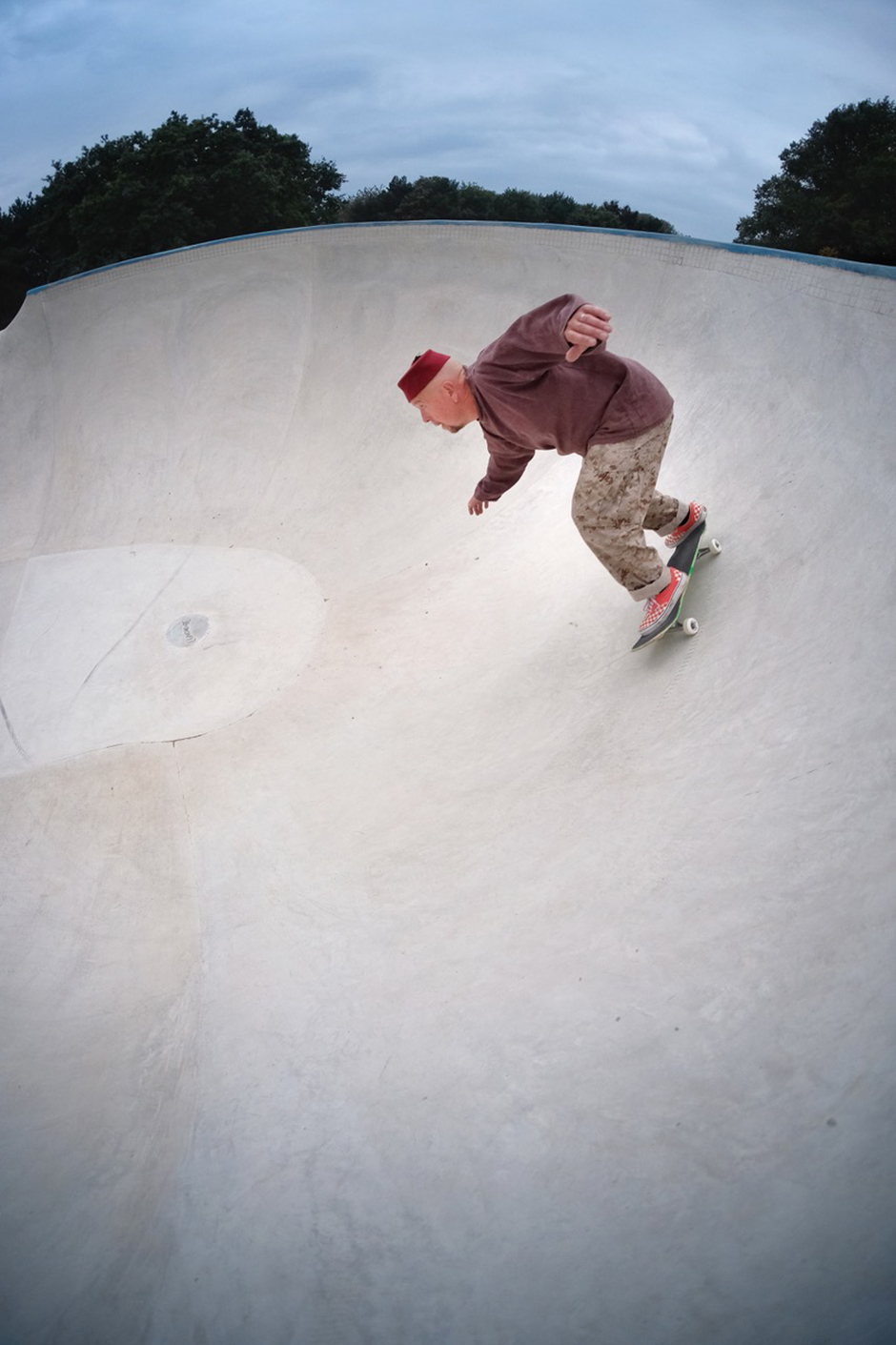A discussion on skateboarding as an older novice with Josh Sutton and Esther Sayers. Words and illustrations by Josh Sutton.
The day I started skating three years ago, I inadvertently joined a unique group of adults, that is adults who skate as opposed to skaters who grew up to be adults
“Grow up!” That’s what the miserable old geezer yelled at me from his car window, turning the steering wheel slowly in his string-backed leather driving gloves. His fine trilby hat was pulled down over his eyes, restricting his field of view, but in reality I think it was his 1950s mentality obscuring his vision, rather than any dapper looking hat.
I was pushing along the road on my way to the supermarket for essential supplies during lock-down, the wheels beneath my board sending gentle vibrations up through my body, reminding me that I was still alive, and even a mundane essential trip to the supermarket and back can be a wind in the hair thrill. Not that I have any hair these days, I took up skateboarding in my early 50s.
The pensioner, in his polished and cherished car, accelerated gently towards his dotage and out of my mind, that is until a little further down the road when I caught the mutterings of an old dame to her husband as they shuffled from the Post Office, pension books in hand, “Look at that idiot, he thinks he’s a kid.” It seemed that I’d managed to offend some folks, old folks, folks even older than me. What’s so offensive about a guy in his fifties rolling along on a skateboard? Was it me or the board? I think the truth is that skateboards scare some folks; in the same way they scare small dogs that come running after you yapping and snarling at your wheels.
This chorus of disapproval rang out loud, seemingly accentuated by the almost peaceful silence that came with lock-down, a time when keeping a safe distance also appeared to amplify our differences. Cyclists, joggers and dog walkers attract scorn from those who neither do, nor will have, any of it. But in a society free of the threat of this virulent virus, those prejudices will abate. Not so with skateboarding though, and even less so with – for want of a better phrase – senior skaters.
The day I started skating three years ago, I inadvertently joined a unique group of adults, that is adults who skate as opposed to skaters who grew up to be adults. We’re participating in an activity that is perceived by many as solely one for the youth. Thanks to social media it didn’t take long to find others like me, and ever since I’ve been keen to learn of their experiences.
Learning to drop-in after about a year totally blew my mind, it was like someone had just handed me a beer glass that fills itself up once you drain the last dregs from the bottom. From that moment onward I knew that I was hooked on skating. It’s not about recapturing lost youth, it has nothing to do with age. For me it’s about an endless source of enjoyment, a challenge, a way of meeting new people and learning new things, and in many ways meditation. It heals me. So what does it mean to others like me? What do they get from it?
It’s not about recapturing lost youth, it has nothing to do with age. For me it’s about an endless source of enjoyment, a challenge, a way of meeting new people and learning new things, and in many ways meditation. It heals me
I asked Esther Sayers, a senior lecturer in education at Goldsmiths, University of London, whose academic interests are around arts participation, what motivates people to engage with art. She is currently exploring the various immersive pedagogies that operate within the context of the skatepark, with a particular focus on older women as a means to explore the navigation of risky behaviours, age and motherhood.
“I think it is important to make visible the area of skateboarding not as a child or as an adult that has done it for years but as older newcomers. It’s not Thrasher and it’s not Middle Aged Shred. We are talking about something different, something more radical I think,” says Esther, who started skating in her late 40s.
Josh Sutton: Radical maybe, but why? It strikes me that if I were to tell people that I had just returned from a skiing holiday, they would not bat an eyelid. But when I explain that our last family holiday was spent touring the skateparks of the Basque Country, people seem to think that I’m insane.
Esther Sayers: Yes! Our family holidays are always skate tours now but during the last one to Dorset I found that it was often me skating alone. I often out skate my kids these days – my drive is more urgent somehow. They have years left to skate, I on the other hand find every moment precious and treat it as such. It’s normal to do that kind of holiday in a ski context, but not skate.
Maybe it’s to do with the fact that people seem to become more risk averse as they age, too comfortable perhaps. Me skateboarding, for example, has pissed off some of my closest people, like it’s an affront somehow, messing with the status quo of age and expectations. My life outside skateboarding was already established, even too established – adulthood is constricting. Skating has helped me deconstruct the confinement of adulthood.
Esther Sayers enjoying a precious moment at Hackney Bumps. Photo: Henry Kingsford
My life outside skateboarding was already established, even too established – adulthood is constricting. Skating has helped me deconstruct the confinement of adulthood
Adulthood can be constricting, not least because our aging bodies interfere with our capacity to perform the feats we took for granted in our youth. But aside from the physical, there are social codes of conduct, practices and expectations that seem to multiply the older you get, especially as a parent.
It was my son that actually got me into skateboarding. I could see the fun that he was having at the park and as I was constantly down there, keeping my eye on him I thought “Why not have a go myself?” The only way to join this club is to participate. I bought a cruiser and spent the first year just pushing around on the flatground, finding my balance. When I say finding my balance, I mean both physically, in terms of trying not to fall off my board, and socially.
How would those using the park react to a middle aged man sharing common space with people much younger than them? Oddly enough, no one at the skatepark seemed bothered when I first showed up. All I ever got was encouragement from those around me. Age, it seemed, didn’t matter to skaters. I expect that the few parents and grandparents sitting on the park benches watching their offspring (like I used to do) might have had other ideas though. But then again, I’m a man and it’s here that my experience differs greatly from Esther’s.
“Anyone can participate and being committed and persevering is the route to inclusion. There is so much support for anyone who has a go,” says Esther. “The level of support and encouragement is mind blowing, but I get dropped jaws from kids who see me and stare. I must look like their teacher or their mum or grandma! What they see does not compute with their world view where older women look after them. A four year old at Hackney Bumps watched me intently through the fence and then said, “I didn’t know mummies can do that.” I love that I’m spinning the usual order of things on its head. Social expectations anticipate that older adults and particularly mothers with children should not get involved with action sports, danger or risk. As Spowart and Burrows (2016) remark in their work on snowboarding mothers, ‘Tensions exist between the identities of a “mother” and the risks often associated with participating in action.”
Whilst we have much in the way of shared experience in learning to skate later in life, it’s not until Esther brings up the notion of parental roles that I begin to think that I might have an easier ride. Dads riding a skateboard, well that might appear childish, or maybe even gung-ho, but mums clearly face challenges most men don’t encounter. Sure I can drop-in and hit the odd slash grind here and there, but I don’t think I’ll ever get the hang of stereotypes.
Josh Sutton enjoying the fruits of summertime graft at Horsforth Skatepark. Photo: Brendan Harrap
Sutton: Back in the park, I found that other skaters were more than willing to share their knowledge and were stoked when they could see I was making progress. The teenagers became teachers.
Sayers: My 13 year old son has become very good at psyching me into things. He’ll say, when I stall over something I could do the day before, “Mum, the ramp hasn’t changed, you’ve done this, you’ve got this.” We started learning together and he is now way ahead, but amazingly still likes to skate with me every now and again.
Sutton: This makes me chuckle as I can recount very similar scenes with my own son. There was a period a year or so back where I found myself at my local, Hyde Park in Leeds, standing around with a bunch of other dads, bemoaning the fact that our kids don’t want to come skating with us anymore. It brings to mind your comments about the radical element of people learning to skate later in life. It’s radical because we are doing it for the first time, unlike other adults returning to skating after a hiatus, and that brings with it an advantage. We are free of the feeling that we can no longer do the things we used to be able to do. I often encounter, both in reality and through watching clips, parts and in written media, veteran skaters who lament their shrinking trick portfolios. This is in direct contrast to our experience, where every bit of progress is simply that, progress. It’s an achievement, something new.
Sayers: Sure, but our progress, particularly at our age, is metered by the possibility of injury, the risk, must be outweighed by the potential gain. Arguably, the social and psychological health benefits from skating and especially gaining a new trick (your never ending beer glass) are greater than the risk presented by another swell-bow or similar. A sedentary, risk averse, lifestyle would be potentially more destructive to health in the long run. Rodney Mullen talks of ‘cognitive override’ in one of his TED talks. He describes the situation, where “Every fibre of your being says don’t do that again”, but skaters get up and the cognitive override kicks in.
Sutton: I think this goes some way towards explaining why, certainly for me, that progress appears much slower when compared to that of my son. That cognitive override is inhibited by the knowledge that my ageing body takes longer to heal.
Sayers: To engage in skateboarding I have to overrule social expectations and find a balance between risk, skill and the subconscious. To find the tipping point that occurs after learning the skills to do something. This is when I have to stop thinking about it and let my body take over. Trust that I know what to do, feel it: not think it. There is an enormous need to trust in your skills and let yourself be out of control, to embrace that feeling and enjoy it. To allow the body to take over from the mind. As an adult learner, this is difficult to do as we have learned to try to control everything.
Learning by trial and error, as my son and 10 year old daughter do, is too risky for me. Being in a good physical state is important. I take longer to recover from injury, so I am more cautious than a child. As an expert professional I needed to be a learner again. To be shit at it and know nothing, to learn from my children and their friends. This allowed me to re-evaluate learning and explore through my own experience, through my body. The learner/teacher dynamic is fascinating in the skatepark, I’m interested in reciprocal exchange that takes place as part of critical pedagogy – a political act that empowers rather than stultifies the learner.
Sutton: But why now, especially given what you’ve just said about the risks involved? Why learn to skateboard in your late forties?
Sayers: There are loads of reasons why now is the ‘right’ age for me to learn to skate. As a young woman I was way too self conscious to fail publicly and to look like a dick. Now I have the confidence of an older established woman. I’m not looking to impress or find a boyfriend. I am kind of free from some of the things that would have made me self-conscious. I’d made quite a few big steps forward in my life; buying a house, having kids, getting a PhD. Those progressions had been achieved, and new challenges or life moments had slowed up. Then along came skateboarding and I could keep growing and changing rather than settle into contented middle age. I didn’t want to stop developing, evolving.
Then along came skateboarding and I could keep growing and changing rather than settle into contented middle age. I didn’t want to stop developing, evolving
Sutton: That’s punk. That notion of just doing something, getting up and having a go, regardless of what others might think. I like that. For me there is a similarity in the idea present at the dawn of the punk era in the mid-to-late 70’s, that anyone could get up on stage and form a band. “This is a chord, this is another, this is a third – now form a band.” In many ways this translates into my own experience of first stepping on a board. By doing so I joined a band, it felt like I’d come home.
There’s also a huge DIY culture and artistic creativity among skateboarders and this appeals to me greatly, particularly vis-á–vis corporate behemoths and the olympicisation of skateboarding itself. Progressing on my board and learning new stuff, most recently getting backside slashes, feels like I used to when I added another 7” single to my record collection. It somehow legitimises my position as a skateboarder.
Sayers: Also, that idea of ‘skill sharing’ – the idea that knowledge is something to be shared collaboratively, not ‘held’ by experts and dispensed to the masses. This is a punk idea and one that is very much in play in the pedagogy of the skatepark. It’s where the regulation and calibration that will happen as part of skateboarding’s inclusion in the Olympics, Street League and other big competitions worries me. What we learn and when we learn it is up to us, and our bodies. It’s not part of a syllabus, we don’t have to follow a set route and there is no all knowing ‘teacher’ figure who will judge us.
For me learning a new trick brings an enormous sense of reward. It’s like acquiring something new. I think about this as an alternative or resistance to capitalist consumer culture. I feel that the reward and the acquisition of a new trick as a thing, it’s something I have, something I own but it has no commercial value. The satisfaction is like a new pair of shoes but much better. I don’t need to acquire goods when I can acquire new things to learn. I guess this is part of the punk, DIY, do it for free, resist ideology that I and you I expect were acculturated with as youths.
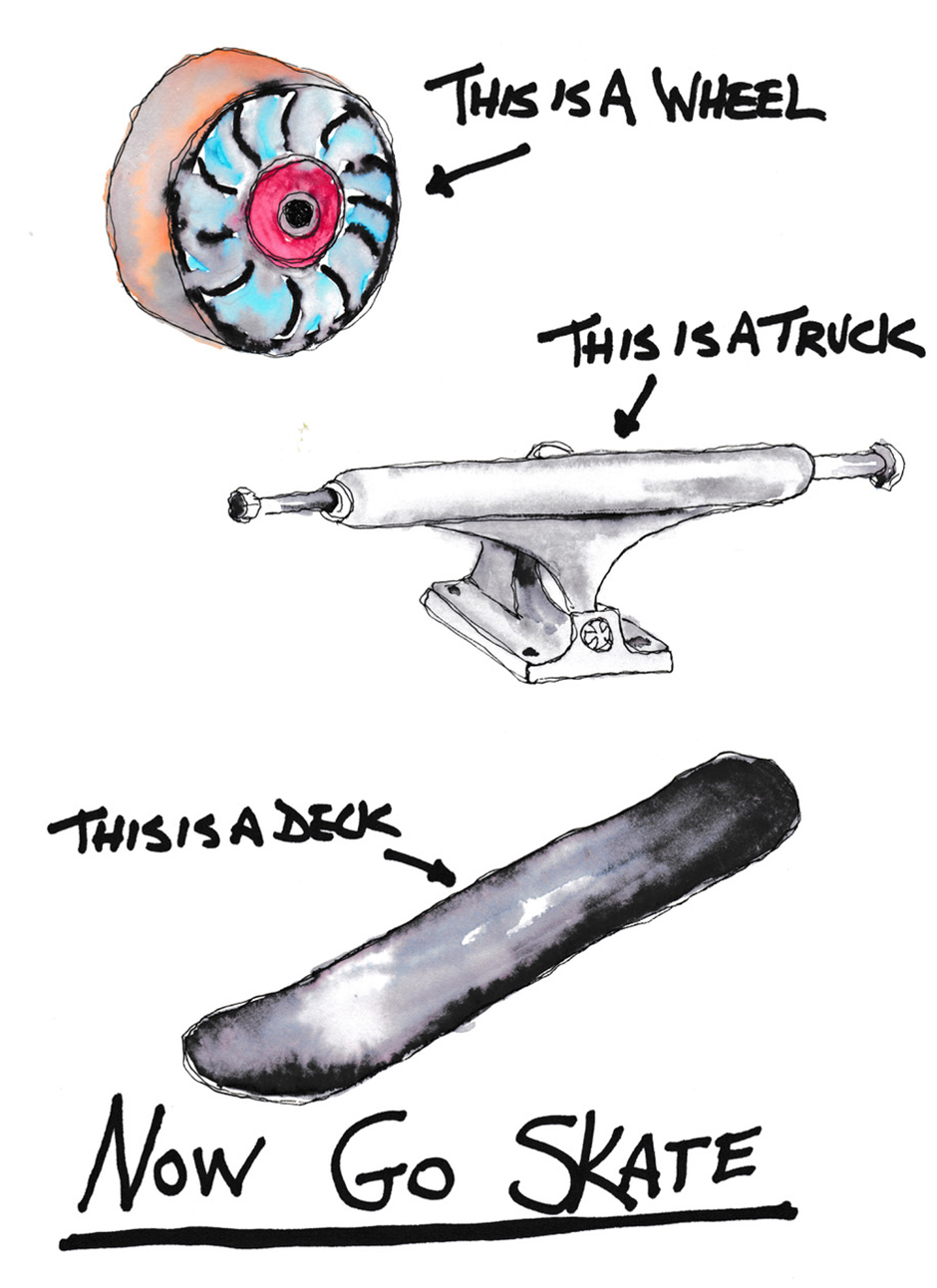
Esther is right about that. I was brought up to question authority, don’t always assume that those in charge actually know what they are doing. By taking up skating in my fifties I feel that I am challenging the norm, so when the miserable chap in his car tells me to grow up, I just push harder, faster, looking for the next challenge (frontside slash grinds).
“I really like this notion of how skateboarding is seen by older people in society,” she concludes. “This rocking of the natural order of things makes some people uncomfortable. It’s taken me a while to realise their reaction is most often about them and not actually about me. I shouldn’t internalise their vibe. The discomfort that my skating produces in others is theirs to deal with. I just ride on. The feeling of rolling removes the block that comes from feeling self conscious, conspicuous. My skating is seen negatively as showing off by some of my peers. Too right I’m showing off! It’s a hard won skill. I don’t make much art for exhibitions these days, instead I skate, and this involves my body. But I’m not showing off my body, I’m showing off what I can do with it. Celebrating (still) being able to.”
I don’t make much art for exhibitions these days, instead I skate, and this involves my body. But I’m not showing off my body, I’m showing off what I can do with it. Celebrating (still) being able to
Josh carving the bowl at the skatepark he helped build. Photo: Brendan Harrap
Josh Sutton is a writer and illustrator from Leeds, West Yorkshire and the author of several books on travel and cooking including ‘CookPal’, a recipe book inspired by his time volunteering with SkatePal and in support of their work. Keep up to date with Josh on Instagram at @guyropegourmet and @redfezbooks or at joshsutton.co.uk
References: Spowart & Burrows Negotiating Moral Terrain: Snowboarding Mothers, in Women in Action Sport Cultures: Holly Thorpe, Rebecca Olive. Palgrave Macmillan: 2016 / Esther Sayers: Motion as Material


